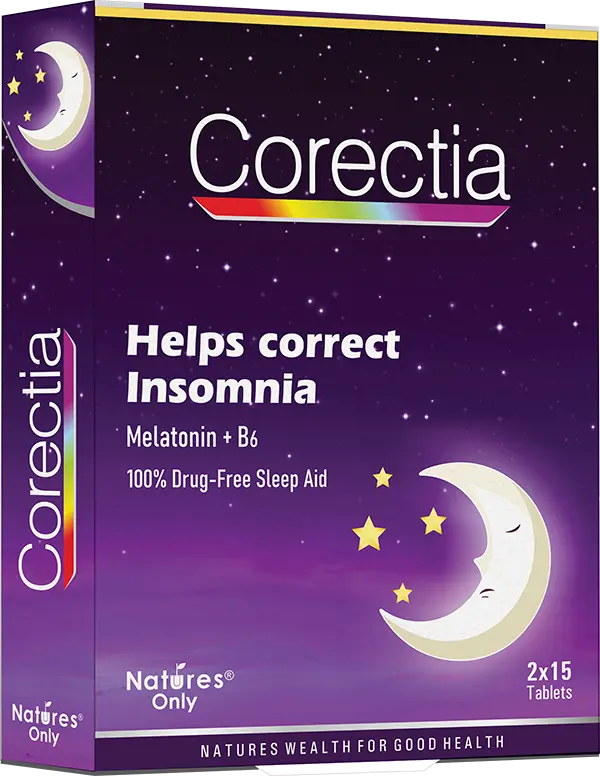
Melatonin and Vitamin B6 are both commonly used supplements to treat insomnia.
Melatonin, a hormone produced by the brain's pineal gland, plays a crucial role in regulating sleep and wake cycles.
It can help reduce the time it takes to fall asleep, improve sleep quality, and regulate the body's internal clock. Vitamin B6, on the other hand, is involved in the production of neurotransmitters that regulate mood and sleep.
Corectia tablet is formulated to improve the quality of sleep and can relieve the effects of Jet lag. It lets you wake up feeling refreshed, energized, and healthy. Corectia tablets are free from preservatives, and artificial colors.
Melatonin
Vitamin B6
- Contains a natural hormone which helps to regulate the sleep-wake cycle
- For the temporary relief of Sleep disturbances and mild anxiety
- It works 20-30 minutes before sleep

No Gluten

No soy

No wheat

No Preservatives

No added yeast

No artificial colours

No flavours
Vitamin B6 is necessary for the production of serotonin. Vitamin B6 is required to convert the amino acid tryptophan into serotonin, since serotonin is a precursor to melatonin. Corectia supplement with the combination of vitamin B6 and melatonin can have beneficial effects on sleep disorders.
Melatonin levels decline gradually over the life-span and may be related to lowered sleep efficacy, very often associated with advancing age, as well as to deterioration of many circadian rhythms. Additionally, the exogenous administration of melatonin has been shown to increase the expression of suppressors of cytokine signaling, thus enhancing the immune response and contributing to the anti-aging effects.
For adults 18 years and above one tablet per day 20-30 minutes before sleep or as per physician's recommendation. Swallow with a glass of water. Not to be chewed. Do not exceed the recommendation intake.
Daily melatonin consumption is considered safe. As well as taking vitamin B6 in doses of 100 mg daily or less is generally considered to be safe.
It is known that the cardiovascular system is affected by circadian rhythms. Experimental studies show that melatonin can play a beneficial role in muscle breakdown in several chronic diseases such as heart failure. In addition, melatonin has valuable effects on cardiovascular health, blood pressure, and endothelial function and may be beneficial for patients with heart failure.
Evidence has shown that melatonin can contribute to the treatment of diabetes by inducing insulin secretion and improving β-cells.
Melatonin secretion decreases during aging. Reduced melatonin levels are also observed in various diseases, such as types of dementia, some mood disorders, severe pain, cancer, and diabetes type 2. Melatonin dysfunction is frequently related to phasing and coupling of circadian rhythms.

Follow Us @naturesonlyglobal